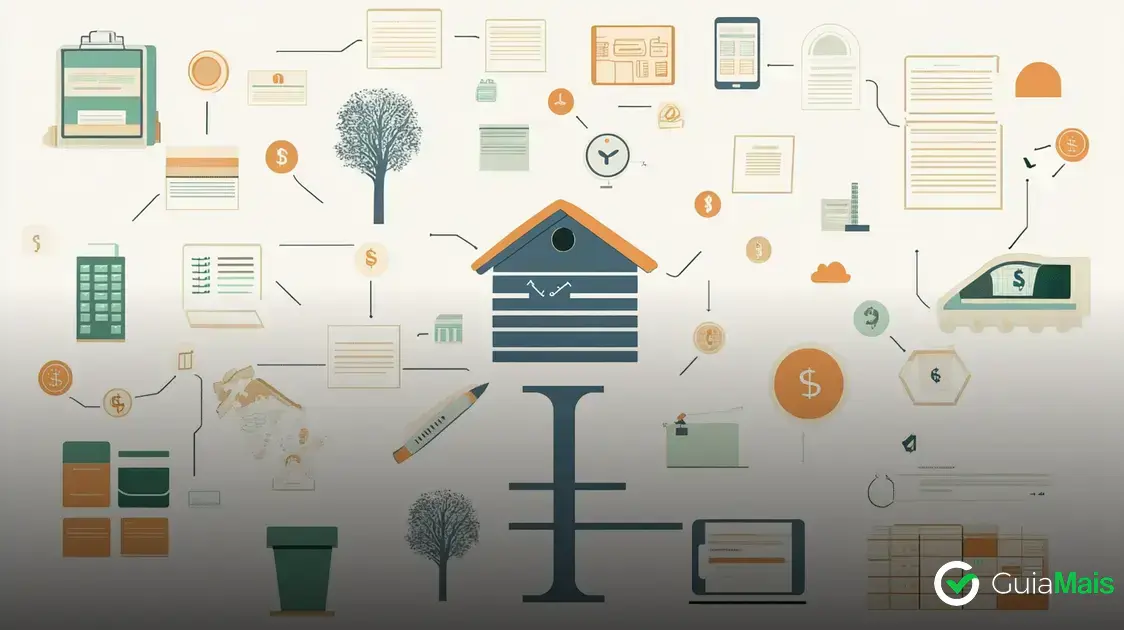Financial literacy is the ability to understand and manage personal finances effectively, including budgeting, saving, and investing.
Building these skills helps individuals make informed financial decisions, avoid common pitfalls, and achieve their long-term financial goals.
Are you ready to take control of your finances?
Our Financial literacy guide will help you understand essential financial concepts, improve your budgeting skills, and empower you to make informed decisions. F
inancial literacy is crucial in today’s world, and this guide aims to provide you with the necessary tools to achieve financial success.
Understanding Financial Literacy
Understanding financial literacy is about knowing how to manage your money effectively.
It involves grasping the basic concepts of finance, including budgeting, saving, investing, and avoiding debt.
Financial literacy equips you with the skills to make informed decisions about your personal finances and helps you navigate the economic landscape.
What is Financial Literacy?
Financial literacy means having the knowledge to make sound financial decisions.
This includes understanding financial terms, creating a budget, managing expenses, and planning for the future.
Being financially literate enables individuals to achieve their personal and financial goals.
Importance of Financial Literacy
Having a strong foundation in financial literacy is crucial for various reasons. It helps people to:
- Make informed decisions about spending and saving.
- Avoid debt traps by understanding interest rates and repayments.
- Build a solid credit history, which is essential for loans and mortgages.
- Invest wisely to prepare for retirement and unexpected expenses.
Key Components of Financial Literacy
To become financially literate, one must understand several key components:
- Budgeting: Creating a plan for how to spend and save your money.
- Saving: Setting aside money for emergencies and future needs.
- Investing: Learning to put your money to work for you through stocks, bonds or other assets.
- Managing Debt: Understanding how to responsibly use credit and pay off loans.
By focusing on these areas, individuals can improve their financial health and overall well-being.
Benefits of Financial Literacy
Benefits of financial literacy extend far beyond managing money.
Being financially literate helps individuals make wise choices, prepares them for emergencies, and enables long-term planning. Here are some key advantages:
1. Improved Decision-Making
Financial literacy allows you to make informed choices regarding budgeting, investing, and spending.
With better decision-making skills, you can avoid unnecessary debt and prioritise your financial goals.
2. Increased Savings and Investments
Understanding finance helps you set savings goals and encourages you to invest wisely.
As you grow more confident with your financial knowledge, you’re more likely to look for opportunities that generate income.
3. Reduced Stress
Financial worries can be a significant source of stress.
By becoming financially literate, you will feel more secure in handling your finances, which can lead to a calmer and more balanced life.
4. Better Preparedness for Emergencies
When you’re financially literate, you will understand the importance of having an emergency fund.
This preparation makes it easier to tackle unexpected expenses without falling into debt.
5. Enhanced Credit Knowledge
Financial literacy teaches you how credit works, including the impact of interest rates and credit scores.
This knowledge is essential for making wise borrowing decisions and ensuring you maintain a good credit rating.
6. Greater Financial Independence
With the skills gained through financial literacy, you can take control of your finances and achieve independence.
This empowerment leaves you feeling confident in your ability to support yourself and your family.
7. Ability to Plan for Retirement
Financial literacy equips you with the knowledge to plan for the future.
Understanding investment options and retirement savings can help ensure a comfortable lifestyle in your later years.
Basic Financial Concepts Everyone Should Know

Understanding basic financial concepts is crucial for managing your money effectively.
Here are some of the essential financial concepts everyone should know:
1. Income
Income is the money you earn from various sources, such as your job, investments, or other activities.
Knowing how much you make is vital for budgeting and planning your finances.
2. Expenses
Expenses are the costs you incur in your daily life. These can be fixed expenses, such as rent and utility bills, or variable expenses, like food and entertainment.
Tracking your expenses helps you understand where your money goes.
3. Budgeting
Budgeting is the process of creating a plan for your income and expenses.
A budget helps you manage your money by allocating funds to different areas, like savings, necessities, and discretionary spending.
4. Saving
Saving involves setting aside money for future needs or emergencies. Establishing a savings goal encourages better financial habits.
A common recommendation is to aim for at least three to six months’ worth of living expenses in savings.
5. Compound Interest
Compound interest is the interest calculated on the initial principal and also on the accumulated interest from previous periods.
Understanding this concept helps you appreciate the value of saving and investing over time.
6. Credit and Debt
Credit refers to the ability to borrow money with the promise to pay it back later.
It’s important to understand how credit works, including interest rates and potential debt traps, to manage your finances wisely.
7. Investment
Investment is the allocation of money into assets with the expectation of generating income or profits.
Getting familiar with different types of investments, such as stocks, bonds, and real estate, is vital for building wealth.
8. Financial Goals
Setting clear financial goals gives you direction and motivation. These could include saving for a vacation, buying a home, or preparing for retirement.
Having specific goals helps you make better financial decisions.
Budgeting Tips for Beginners
Budgeting tips for beginners are essential for those looking to manage their finances more effectively.
Here are some practical tips to help you get started:
1. Track Your Income and Expenses
The first step in budgeting is to know how much money you have coming in and where it goes.
Use a notebook, app, or spreadsheet to record all sources of income and every expense, big or small.
2. Set Clear Financial Goals
Identify your short-term and long-term financial goals.
Whether it’s saving for a vacation, a new car, or retirement, having clear goals makes it easier to create a budget that works for you.
3. Create a Realistic Budget
Your budget should reflect your actual income and necessary expenses.
Divide your spending into categories such as housing, transportation, food, and entertainment. Ensure your budget allows for some flexibility.
4. Use the 50/30/20 Rule
A popular budgeting method is the 50/30/20 rule. Allocate 50% of your income to necessities, 30% to wants, and 20% to savings or paying off debt.
This simple model can guide your spending habits.
5. Review and Adjust Regularly
Life changes, and so should your budget. Review your budget monthly and adjust as necessary.
This might mean cutting back on certain areas or allocating more funds to others.
6. Avoid Impulse Purchases
Impulse buying can derail your budget.
To prevent this, create a shopping list before you go out and stick to it. Consider a waiting period for non-essential items before making a purchase.
7. Use Budgeting Tools
Consider using budgeting apps or software to simplify the process.
Many tools are available to help you track expenses, set goals, and analyse your spending patterns.
8. Build an Emergency Fund
Try to save at least three to six months’ worth of living expenses in case of unexpected situations like job loss or medical emergencies.
This fund will provide security and prevent you from going into debt.
By implementing these budgeting tips, beginners can gain control over their finances and work towards achieving their financial goals effectively.
Saving and Investing Strategies
Saving and investing strategies are crucial for building wealth and ensuring financial security.
Here are some essential strategies that can help you save effectively and invest wisely:
1. Pay Yourself First
Set aside a portion of your income for savings before paying other bills or making purchases.
This approach ensures that saving becomes a priority in your budget.
2. Establish Clear Savings Goals
Determine what you are saving for, whether it’s an emergency fund, a home, or retirement. Specific goals make it easier to stay motivated and on track.
3. Use a High-Interest Savings Account
Look for savings accounts that offer higher interest rates. This way, your savings can grow faster over time through earned interest.
4. Create an Emergency Fund
Aim to save three to six months’ worth of expenses in an easily accessible account. This fund will help you manage unexpected costs without resorting to debt.
5. Start Investing Early
The earlier you begin investing, the more time your money has to grow due to compound interest.
Consider starting with small amounts and increase your investments as you grow more comfortable.
6. Diversify Your Investments
Don’t put all your eggs in one basket.
Diversifying your portfolio by investing in different asset classes, like stocks, bonds, and real estate, can help manage risk.
7. Educate Yourself on Investment Options
Research various investment vehicles, such as mutual funds, exchange-traded funds (ETFs), and individual stocks.
Understanding each option will help you make informed decisions.
8. Review and Adjust Your Strategy
Regularly evaluate your savings and investment strategies to ensure they align with your current financial goals and market conditions.
Make adjustments as necessary to stay on track.
By following these saving and investing strategies, you can build a solid financial foundation and work toward achieving your long-term financial goals.
Common Financial Mistakes to Avoid

Avoiding common financial mistakes is essential for achieving financial stability. Here are several mistakes to watch out for:
1. Not Having a Budget
Many people fail to create a budget, leading to overspending and poor financial management.
A budget helps you track your income and expenses, allowing you to make informed decisions.
2. Ignoring Savings
Some individuals neglect to save for emergencies or future goals.
Regularly setting aside funds, even a small amount, can significantly impact your financial security over time.
3. Accumulating Debt
Taking on unnecessary debt, especially high-interest debt like credit cards, can result in financial strain.
It’s crucial to use credit responsibly and pay off balances quickly.
4. Failing to Build an Emergency Fund
Not having an emergency fund can lead to financial distress when unexpected expenses arise.
Aim to save three to six months’ worth of living expenses to prepare for emergencies.
5. Chasing After Trends
Investing in trendy stocks or financial products without research can result in losses.
It’s essential to make informed investment choices based on sound research and not just popular opinion.
6. Overlooking Retirement Savings
Waiting too long to start saving for retirement can reduce the amount you have when you retire.
Make use of retirement accounts and employer matching contributions if available.
7. Making Emotional Financial Decisions
Allowing emotions to drive financial decisions often leads to mistakes.
Stay objective and make decisions based on well-thought-out planning and analysis.
8. Neglecting to Review Financial Statements
Failing to review bank statements and credit reports regularly can result in unnoticed errors.
Regular reviews help you catch mistakes, monitor spending, and detect fraud early.
By being aware of these common financial mistakes and taking steps to avoid them, you can develop healthier financial habits and work toward your financial goals more effectively.
Resources for Financial Education
Resources for financial education are essential for improving your understanding of money management. Here are several valuable resources you can explore:
1. Online Courses
Many websites offer free or low-cost online courses focusing on financial literacy.
Websites like Coursera, Udemy, and Khan Academy cover topics from budgeting to investment strategies.
2. Books
Reading books on personal finance can provide in-depth knowledge.
Some highly recommended titles include “Rich Dad Poor Dad” by Robert Kiyosaki and “The Total Money Makeover” by Dave Ramsey.
3. Financial Podcasts
Listening to financial podcasts allows you to learn on the go.
Popular podcasts include “The Dave Ramsey Show” and “ChooseFI,” where hosts discuss various financial topics and share tips.
4. YouTube Channels
YouTube is a treasure trove of financial education content.
Channels like “The Financial Diet” and “Graham Stephan” offer insights on budgeting, saving, and investing through engaging videos.
5. Financial Blogs
Following personal finance blogs can keep you updated on the latest trends and tips.
Blogs such as “NerdWallet” and “Smart Passive Income” provide valuable information for managing your finances.
6. Community Workshops
Check local community centres or libraries for free workshops on financial literacy.
These workshops can provide practical knowledge and connect you with others who share similar goals.
7. Financial Apps
Using financial apps can make managing your money easier.
Apps like Mint, YNAB (You Need a Budget), and Acorns help you track spending, create budgets, and invest wisely.
8. Government Resources
Many governments provide resources and tools for financial literacy.
Websites like the Financial Literacy and Education Commission (FLEC) in the USA and similar organisations in other countries offer guides and materials for consumers.
By exploring these resources, you can enhance your financial education and make informed decisions about your money.
FAQ – Frequently Asked Questions about Financial Literacy
What is financial literacy?
Financial literacy is the ability to understand and manage your financial resources effectively, including budgeting, saving, and investing.
Why is budgeting important?
Budgeting is crucial because it helps you track your income and expenses, allowing you to make informed financial decisions and avoid overspending.
How can I start saving money?
To start saving money, create a budget, set clear savings goals, and pay yourself first by allocating a portion of your income to savings.
What are common mistakes to avoid in personal finance?
Common mistakes include not having a budget, ignoring savings, accumulating unnecessary debt, and not reviewing financial statements regularly.
What resources can I use to improve my financial education?
You can use online courses, books, podcasts, YouTube channels, personal finance blogs, and community workshops to enhance your financial knowledge.
How does compound interest work?
Compound interest is the interest earned on both the initial principal and the accumulated interest from previous periods, allowing your savings to grow faster over time.





